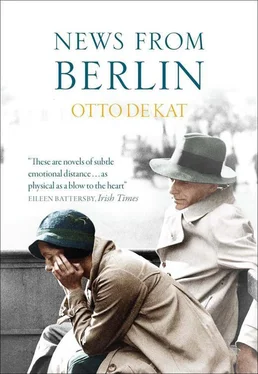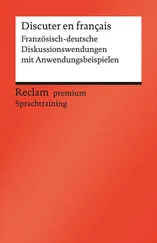He had held her hand for the last hundred metres back to her hotel, because it was slippery underfoot, and she might fall. Her hand in his for a hundred metres. That was what it all came down to: her hand had never let go. He had left her on the terrace of Hotel Jungfrau. At the very last, he had pulled her glove off her hand and held her warm palm against his cheek. A minor embrace with major consequences. Naked, the intimacy could not have been greater.
The walk from Hotel Jungfrau to Kleine Scheidegg was not steep, a mere stroll to a mountaineer, but Lara and Oscar had made their way carefully, slowly, as if they were waiting for something to happen. They had paused often. A rumbling noise coming from the side of the mountain was the echo of a small avalanche, they saw it rolling towards them in slow motion, innocently far off, in a landscape sculpted by avalanches.
Excitedly, she pointed to a group of chamois high on the flank of the Jungfrau.
“Were those goats what you were looking at with your binoculars?”
She smiled and laid her hand on his sleeve.
“Such curiosity! No, that was not what I was looking at, because they weren’t there. I was trying to spot a party of mountain climbers I had talked to in the village. One of them reminded me of Harold.”
She had told him about Harold, the man she had lost, to what or to whom she was not sure. The years with him had been wonderful and exciting. And they had ended as abruptly as they had begun. Three years ago she received a letter from him saying that he would not be returning to Switzerland. They had both been working in Basel when he was suddenly called away. He was a petrochemical engineer, she had a job at the university, they lived quite near each other and they had never married. Still, he had been her anchor among all those Swiss. In his last letter he said he had joined the army, special branch, he did not go into any detail. As an Englishman he could not refuse the call of duty. He had asked her to give notice to his landlord and to sell off his furniture; the proceeds were hers to keep.
“I dream about him quite regularly, always the same dream. That he’s right there all of a sudden, and I want to scream at him, but no sound comes out of my mouth.”
Oscar was put in mind of Kate, who had used the same terms to describe her years with Roy, her first husband: wonderful and exciting. As she had told him little else, those years had assumed mythical proportions: the prime of Kate and Roy in the gilded early years of the twentieth century. Later, she had rebuilt her life with Oscar, a life of measure, a life of appointment diaries and dinners and much waiting. Waiting for a new posting, for Emma, for news from a world in disarray. Berlin had been the watershed. Kate had cast off convention and expectation to become a theatre assistant in the Charlottenburg hospital. There, the flood of insanity came pouring in by ambulance and stretcher: stab wounds, gunshot wounds, broken bones, smashed arms and legs, bleeding heads. An unending stream of casualties, victims of the violence perpetrated by the bullies against Jews or Communists. Kate knew more about what was going on than all the diplomats around her dinner table combined. She had first-hand knowledge of how far the hatred had progressed.
*
What was the time? Settled on his sub-tropical café terrace, Oscar whiled the afternoon away. Time had little meaning there, the siesta cancelled out all sense of urgency. He was easily drawn into the slow rhythm of a Portuguese day. He settled the bill and strolled to the tram stop. The Alfama was waking from a deep afternoon slumber, doors were opened, there was shouting and laughter. From a radio came fado music, the pride of the nation. He was not impressed. Misjudged melancholy came to mind. He remembered an evening with Envoy Sillem and his entourage, and having to endure never-ending rounds of those mournful songs. Still, Lisbon was a breath of fresh air after Berne. The city of light with the tang of brine in the breeze, the squares with palm trees, the men with their arms around each other, the gesticulations, the women in colourful dress. And no sign of war, no threat, just a strip of land on the margin of the continent, overlooked. All over Europe the lights were going out, but not there. Portugal was a lighthouse in a darkened landscape.
The downhill ride took much longer than going up, with many more people getting off and on as the tram made its leisurely, summery way to the centre.
Equally leisurely had been the cog-wheel train to Lauterbrunnen, nosing down the track towards the valley, down to the mainline station and ordinary trains, back to their ordinary lives. To the parting of their ways. He sat opposite Lara, his travel bag leaning against hers, which gave him the odd sensation of having achieved something. Bag nudging bag was not such a big leap from hand in hand. The thought of her clothes folded up in her luggage was pleasing in itself. Their knees touched from time to time; the compartment was small and the incline steep. They had not spoken, they had looked out of the window, seen nothing but fir trees, top-heavy with snow. In the glass Oscar caught his reflection and Lara’s in the illuminated interior, their faces averted and quiet. Two days in comparison with a lifetime was nothing, two days could not amount to much.
A conductor passed nimbly from one carriage to the next. He paused a moment on an outside ledge to close the door behind him and open the one in front, an acrobat in the service of ticket inspection, stepping from one moving carriage to the next, each with its own complement of passengers with different destinations and yet all part of the same train chugging forward at a snail’s pace. The war was stealing closer, though they did their best to deny it by avoiding the subject altogether.
At Lauterbrunnen, they found themselves back in the real world. Oscar saw the platform swarming with uniforms: the Swiss had mobilised a huge army. General Guisan, whose portrait hung in all the restaurants and cafés, had proclaimed that Switzerland would defend itself against any invader, whoever that might be. The man was a secret admirer of Germany, Oscar wanted nothing to do with him.
They changed trains and resumed their tête-à-tête for the journey to Berne. The compartments began to fill up; a haze of tobacco smoke hung in the air. Three more hours of inchoate dialogue, possibly more discreet than in the mountains, but no less intense. Along the Thunersee, where the wheels almost touched the water, she pointed to a boat quietly setting sail. Winter or no winter, unfurling chalk-white in the sun. She pointed to the normal, everyday sights, about which there was little to be said.
Afterwards, he wondered whether he had said too much about himself. He had even told her about Dick, the brother who had left Holland years earlier, and whom he missed. His nostalgia for the days when they formed an unassailable duo – something not even Kate was aware of. Two musketeers. Covered front and back, even the flanks were protected. And so they had borne the early loss of their father, and, in the confidence of their young years, had helped to raise their mother’s spirits. His brother was seventeen at the time, he a year older.
Oscar had shed his natural reserve, but he managed to avoid going into what he did for a living. Something at the Dutch legation, of no particular interest. His vagueness elicited a quizzical glance from Lara, but she had not pressed him. Why had he talked so freely with her for two entire days, why did he feel so helplessly, unconditionally attracted to her? Why indeed. It was not for you to crack the codes of your soul. Oscar had dismissed the question as soon as it presented itself.
“Would it be alright if I looked you up in Fribourg?” he had said as the train entered the station of Berne, to which she had nodded, tapping the leather box containing her binoculars: “I’ll be on the lookout for you.”
Читать дальше












